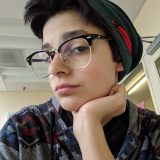Recently, I wrote about the importance of female Jewish writers in the eyes of young Jewish readers. In response to the article, a fellow Emerson student reached out to me to discuss her experiences of reading and writing Jewish characters. Laura Rosenthal is a third-year fiction student who told me that a lack of contemporary Jewish representation affected her writing.
She stated: “Growing up, the only Jewish narratives I was introduced to were Holocaust or circa 1800s immigrant stories. I don’t think I read a Jewish author writing contemporary stories until I got to Emerson, or, if I did, the characters didn’t seem to reflect on their identities at all. It actually had a significant negative influence on my own writing. I think the message I subconsciously inferred was that Jewish characters didn’t exist in the contemporary world.”
As we emailed back and forth, I thought about my own work. I began writing fiction at 13, and by the time I was 19, I had written six (unfinished) novella-length works. Five of them were written entirely within the Novembers of 2009-2013 for NaNoWriMo (National Novel Writing Month), but after squeezing out 50,000 words in 30 days, they were abandoned. These orphaned books featured characters of color, disabled characters, LGBTQ characters, characters from a thousand different backgrounds. However, looking back through this body of work, I noticed something disconcerting. Not a single character was Jewish. In the hundreds of pages I had written, the additional short stories, the hundreds of thousands of words, I had never created the kind of story my younger self needed.
Related
I don’t really believe in writer’s block as a concept. The inability to write comes mainly from fear, and the only way to overcome that fear is to write, even if the work is terrible and self-indulgent. Even so, I found myself snagged on issues of the character’s race and religion, doing tons of research on what I thought I wanted to sidestep in the actual writing. Then, on our way to Einstein Bros. Bagels in Cleveland, my extremely patient girlfriend and the eternal sounding board for this project spoke up.
“Why don’t you make her Jewish?”
I bristled at the idea. Writing a gay Jewish protagonist felt too close to my own life, even within fiction. Olivia then invoked Leslie Feinberg and Jeanette Winterson, and as we continued talking my trepidation fell away.
Of course. Of course this character was Jewish. I’d held her at arm’s length for a quarter of my life and my writing suffered as a result. Laura felt similarly, saying, “Once I realized that the characters I’m writing about are Jewish, my stories started to develop in much more meaningful ways.”
With a few changes, the story began to breathe again. The fear I railed against abated. I could finally write the book the way it wanted to be written, the way it demanded as it nipped at my heels for the majority of my writing career. When I first began the rewrite of this project, a coworker told me, “Listen to what the story is telling you.” I’d been so busy researching and talking and worrying, I’d forgotten how to listen. I’m listening now.




